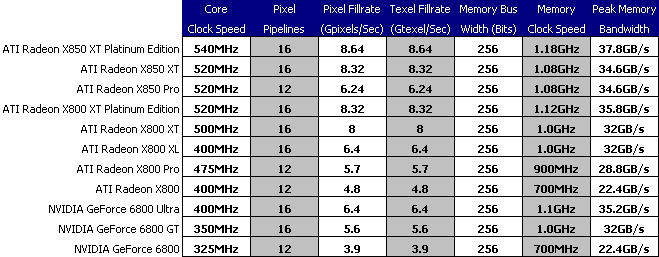Asus Extreme Radeon AX800XL/2DTV
Over the years, Asus has built a solid reputation for manufacturing high-quality products, that consistently match or surpass competing products in terms of both performance, features and quality. It is with that kind of backdrop that we present today's review of the Asus Extreme AX800XL. Based on the ATI Radeon X800 XL VPU, Asus has a solid footing to begin with. The X800 XL is based on the X800 XT VPU, so it comes with the same number of pixel pipelines as its predecessor (16), but it's built on a more advanced .11 micron manufacturing process and comes clocked at lower speeds. What ultimately makes the X800 XL attractive, however, is the more affordable price and lower power consumption requirements. And in typical Asus fashion, their take on ATI's Radeon X800 XL is somewhat different than similar cards from competing manufacturers. Read on to see what sets the Asus Extreme AX800XL apart from other products in its class.
|
|
Asus Extreme AX800 XL Six Vertex Engines High-detail Geometry 3Dc Compression Technology |
Smart Shader HD •_Long pixel shaders •_1536 instructions per pass •_High-detail geometry shaders •_Infinite length shaders (multipass via F-buffer) •_Single pass trig functions (Sine & Cosine) SmoothVision HD •_Sparse sample pattern AA with gamma correction •_Temporal AA (up to 12X effective) •_Centroid AA •_16X Anisotropic filtering with adaptive heuristics HyperZ HD •_Optimized for performance at high display resolutions, including HDTV resolutions •_Lossless z-buffer compression (up to 48:1) •_Rejects up to 256 occluded pixels per clock •_Up to 32 Z/stencil operations/clock VideoShader HD •_High-quality video processing & acceleration •_Real-time user programmable video effects •_Video post processing and filtering •_MPEG 1, 2, 4 encode and decode acceleration •_FULLSTREAM Video Deblocking •_WMV9 decode acceleration •_High-quality resolution scaling •_Adaptive Per Pixel Deinterlacing •_Motion Compensation •_Noise removal filtering •_Display Rotation
|
Although we have covered this before in previous articles, we've got a chart that compares the features of today's ample list of graphics card solutions. The chart below reflects the current high-end segment of the 3D card market:

As we mentioned in the earlier, the Radeon X800 XL is structured very similar to its predecessor, the X800 XT. The major differences revolve around the VPU: the manufacturing process used to make the XL is .11 micron instead of .13 micron for the XTs, and XL's core clock speed is lower. The Radeon X800 XL's 16-pipeline GPU, which is clocked at 400MHz, gives the card a higher peak fillrate than the Radeon X800 Pro (6.4GPixels/s vs. 5.7GPixels/s), and because the X800 XL is also equipped with higher clocked memory than the X800 Pro, the XL's peak memory bandwidth is on par with the standard Radeon X800 XT at 32GB/s. The Radeon X800 XL also matches up pretty well to NVIDIA's upper echelon GeForce 6800 series. It has the same theoretical peak fillrate as the top-of-the-line GeForce 6800 Ultra, and the same amount of total memory bandwidth as a GeForce 6800 GT. To see how the Asus Extreme AX800XL fares in real-world tests in our labs, we will be comparing it against ATi's own Radeon X800 XL and a NVIDIA GeForce 6800 GT.









